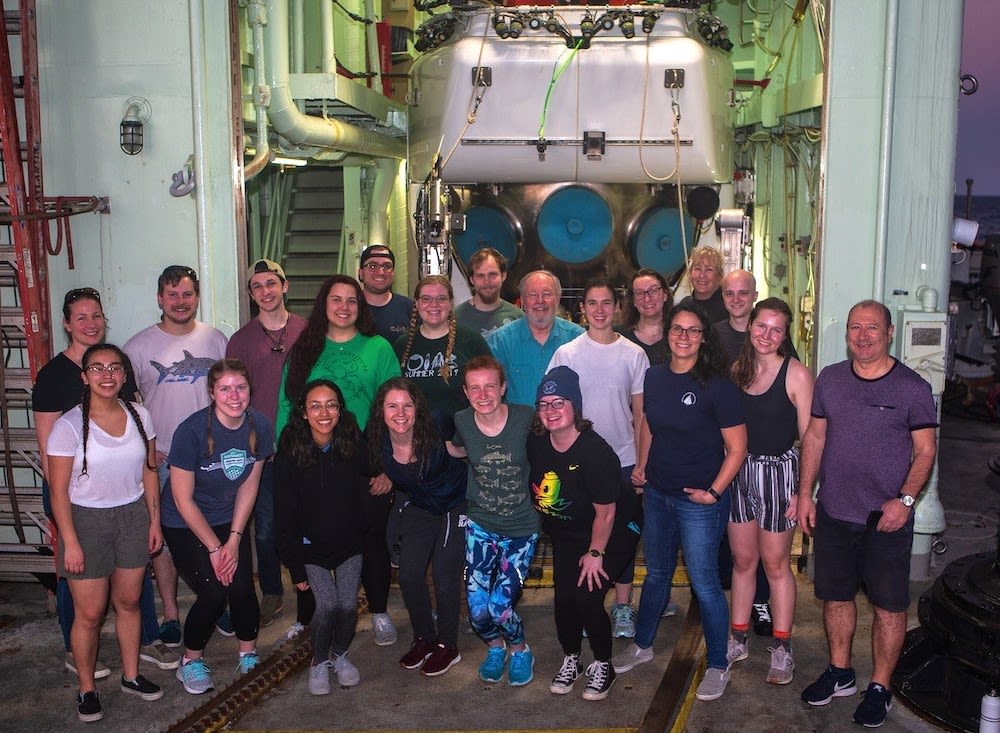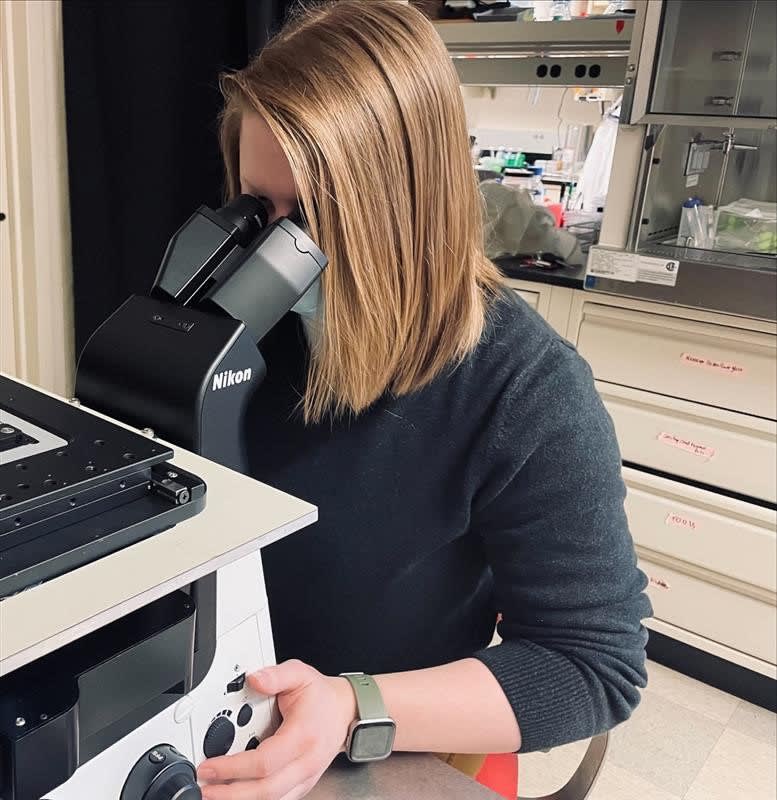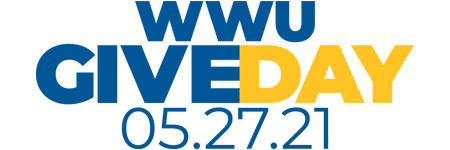The WWU Biology Department provides an outstanding and inclusive learning environment that integrates education, scholarship, and service, actively engages students in the biological sciences, and fosters their development as lifelong learners. Our curriculum spans subdisciplines from marine ecology to developmental genetics to bioinformatics and provides abundant opportunities for interactions with educators who are national leaders in biology education at the college level. Our curriculum is designed to help our students master fundamental biological principles in depth, learn practical lab and field skills to address a wide range of biological questions using sophisticated instrumentation, develop strong critical thinking and quantitative skills, gain confidence in communicating precisely and analytically, and engage independently and collaboratively as thoughtful and productive contributors to society.
 The Arellano Lab boarding the R/V Atlantis for a research cruise along the Gulf of Mexico.
The Arellano Lab boarding the R/V Atlantis for a research cruise along the Gulf of Mexico.
Impact
Your gift to the Biology Department this year will fund student research and travel to conferences, career networking opportunities, and most importantly, scholarships, especially for first-generation and underrepresented students.
 Grad student Hannah Fisher conducting research in the Galati lab.
Grad student Hannah Fisher conducting research in the Galati lab.
Summer Support for Cell and Molecular Biology Grad Students
As you may know, our graduate students have teaching assistantships during the year, but their summer research remains unfunded. We’ve launched a campaign to help our grad students address this summer funding gap and support their critical research. Our goal is to provide summer fellowships ($5,000/student) and research grants (up to $1,000/student) for four to five Biology graduate students whose projects are grounded in cell and molecular biology research. Gifts of every size make a difference, especially when we pool our resources! We also have a matching opportunity to make your gift go even further, thanks to the generosity of Northwest Pathology: they will match your gift 1:1 the first $5,000 in gifts! Check out our Viking Funder Page for more information and to learn more about how Western Biology students and Northwest Pathology partnered to provide COVID-19 testing for the entire nation.
Joann Otto Microscopy Fund:
Over the years, WWU has acquired a significant amount of state of the art microscopy instrumentation through grants to faculty from the National Science Foundation and through donations to the Western Foundation. These fluorescence microscopes allow super-resolution imaging of fluorescent proteins in cells, generating 4D reconstructions of proteins in cells, and high throughput analyses of fluorescently-tagged cells. The most recent microscope uses a laser that pulses 80 million times per second to analyze macromolecular complexes in living cells! Through course-based research experiences and faculty-led research projects, students use these microscopes to learn quantitative fluorescence microscopy and image analysis. After graduation, students leverage their microscopy skills to work in biotechnology firms, biomedical research institutes and top-notch PhD programs. The Joann Otto Microscopy Fund supports student research and helps maintain the Biology department’s suite of research grade microscopes by purchasing new filters and brighter light sources, acquiring new image analysis software, and upgrading workstations to interface with new high-speed cameras. Ultimately, these funds will allow our microscopes to remain at the cutting edge of optical light microscopy to serve the next generation of WWU students.
The Living Snow Project
The Living Snow Project is a university-run citizen science program that empowers local communities to track and sample pink snow, an iconic feature of alpine spring and summer snowpack and glaciers. Snow algae produce intense blooms turning snow and ice pink, orange, or bright red due to bright pigments assumed to provide UV or oxidative stress protection. Their bright color darkens the snow surface, reducing the reflectance of solar radiation and accelerating snowmelt. Thus, glacial melting due to climate change will likely present more favorable conditions for growth, while simultaneously also reducing habitat. There are many different species of snow algae and it is still unknown how biodiversity and biogeography affect snow and glacier melt.
What is the significance of this project?
Climate change is causing glacial loss worldwide, and snow algae blooms can further accelerate melt. Glacial melting also presents favorable conditions for algae growth, while simultaneously reducing their habitat. Volunteer observation and collections of large datasets across mountain-range scales are needed to understand how this process is changing over time. We recruit volunteers through the outdoor recreation community, which is under-engaged in conservation despite their reliance on healthy ecosystems for recreational opportunities. By empowering people of all ages to participate in science in the places they love to play, we help cultivate a deeper awareness of and appreciation for complex alpine ecosystems.
What are the goals of the project?
In 2021, we are expanding our program to integrate algae collections with bloom size and assessment of the snow habitat. Currently, volunteers can participate by collecting samples with a sample collection kit or making observations with the Living Snow Project app. The app stores GPS coordinates and notes about observations if the phone is out of service and sends coordinates once the phone reconnects. Participants who collect samples scoop pink snow into DNA preservative using a sample kit. With improvements to the App, volunteers can include measurements of pink snow patches, record snow pH and snow depth, and upload pictures. We plan a large recruitment effort in spring 2021 to capitalize on the record number of new visitors to public lands in 2020. The funding we raise through this campaign will go to support our WWU student interns and researchers who make this program possible.


